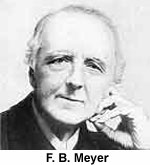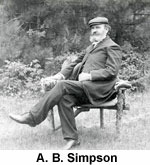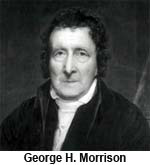
“To the Help of the Lord Against the Mighty”
By T. Austin-Sparks
Edited and supplied by the Golden Candlestick Trust.
Reading: Judges 5:1-23.
The clause which gathers up that whole chapter, and will give us our key for this present message, is at the end of verse 23: “to the help of the Lord against the mighty”.
You will remember that the book of Judges has a peculiar correspondence with the situation which obtains in our own time. That is, it represents a state of things resultant from a work entrusted by God to His people, imperfectly carried out. The book of Joshua is the book of the great trust. The Lord called, equipped, commissioned, assured in relation to the completing of the work which He had commenced when He brought His people out of Egypt and constituted them a vessel for His purposes.
The book of Joshua closes with the work not perfected, and because the thing had not been carried through to completion in the same spirit, the same devotion, the same earnestness as that with which it was commenced, the enemies of the Lord found their opportunity and made good their opportunity. And then the book of Judges gives us the same result; the enemy constantly taking the upper hand, the enemy constantly encamping upon the Lord’s ground; the Lord’s people constantly suffering defeat. They are being reduced to a state of weakness and impotence, with periodical breakings in upon the tragedy under the various Judges, but more defeat than victory, more shame than glory, more weakness than power. These breaks which are spread over a long period of time, while glorious in themselves, are only set over a much greater background of spiritual tragedy, and at length things decline to a state of much shame and disappointment.
That corresponds to things as they are now. You cannot read the book of the Acts of the Holy Spirit without finding that you are very much in line with the book of Joshua. You have something there in the two which is a parallel. In Joshua and the Acts it is the mighty released energies of the Holy Ghost carrying through to victory after victory; fresh territory always being taken, possessed, with a fight, yes, but a fight in victory all the time. But you know quite well that you do not reach the end of the book of the Acts without finding declension setting in.
If the book of the Acts spreads itself over the history of the early church, Corinth, Ephesus, Colossus, Galatia and all the rest, you know quite well that when you read the letters to those churches you are finding in almost every one of them, if not in every one, traces of spiritual weakness and failure. And you know that within forty years of the death of the apostle Paul, John wrote the seven messages to the seven churches. Forty years only have passed since he wrote his letter to the Ephesians, and now the letter is coming to the Ephesians: “…you have left your first love”. You see the work has not been carried through, declension has set in. And so since the apostolic day, with breaks here and there, and there, glorious breaks, yet by far a greater period of spiritual tragedy; the book of Judges is repeated. There is defeat, weakness, shame, the enemy encamping, holding the ground, possessing himself of the Lord’s own inheritance.
Well, that is the position into which we are brought when we come to read the book of Judges. And this particular clause which we have lifted out for the moment, or lifted into clear relief, is the key not only to the whole book of Judges, but it is the key to the whole history of the church, “…to the help of the Lord against the mighty”. That is the situation; that is the background.
The fact is that there are mighty forces set in definite and positive opposition to the completing, the perfecting of God’s age-long, nay, eternal purpose. They are out to circumvent the accomplishment of that which God took in hand from the beginning. They are out to malign God, to rob Him of His glory, to quench His testimony in the earth. They are out to bring His people into spiritual bondage, to bring His people out of a position of spiritual ascendancy, to bring about a state of spiritual weakness, decline, to set up over against the people of God a testimony to the power of the enemy that he should take the glory from God right alongside of God’s own people. That is very true to spiritual history, and that is true now. The issue is just this: “…to the help of the Lord against the mighty”. That throws the whole situation up for us to a point, a very solemn challenge.
The testimony has got to be completed; the purpose of God has got to be perfected; the enemy has got to be fully and finally blotted out, stamped out. The kingdom has to become the kingdom of our Christ, He is to be known in all the earth as Lord, and in the midst of His people He is to be glorious – but not if the enemy can help it! And there is committed to the Lord’s people, in His Name, by His call, by His commission and by His equipment, the settling of that issue. He is not going to do this independently of His people. He is going to do it through them, by them, in them; and it is a matter of co-operation with the Lord for the perfecting of the Testimony, and the consummating of the eternal purpose of God. And the call is: “to the help of the Lord against the mighty.”
The Lord, in a right sense, let us say it, is counting upon our help in this matter, upon our co-operation. Not that we can give Him anything, not that we are anything, not that any help of ours in ourselves can profit the Lord at all. But inasmuch as He has given us His Spirit of might and of power, He calls upon us to come in the power of the Spirit to His help against the mighty. Now that issue is resting upon us. That issue is resting upon me; that issue is resting upon you, upon every one of you. And it is for you, and for me, to definitely face that issue and say in our heart of hearts at this moment: “Now am I really counting for all that God, by His grace and enablement has made possible, as a co-operating factor with the Lord against the mighty?”
Now we come to our chapter. That clause, “to the help of the Lord against the mighty”, divides the chapter into two. It divides between those who do, and those who do not. I am not able to take this whole chapter, but I am just taking part of it in order to indicate on the one hand what the Lord delights in and approves of; on the other hand, what the Lord condemns. And you will find that the chapter just naturally falls into those two sections: that which is to the Lord’s pleasure and comes under His commendation; on the other hand, that which is to the Lord’s displeasure and comes under His condemnation. We will just look at some of those things, taking first of all that which comes under:
The Divine Commendation.
We begin at verse fourteen. Deborah brings into view all the forces which were active in co-operation, and those which were out of co-operation. And she begins to mention them by name, specifically, “Out of Ephraim came down they whose root is in Amalek.” I do not know whether you see the significance of that; it may not lie upon the surface, but it is a tremendous suggestion. What does that mean? It means this, that Ephraim had their place domestically, right where Amalek was, where Amalek was in evidence. And you will at once recall the history of Amalek, that Amalek was a hereditary foe of Israel, always a thorn in their side, always causing trouble, always creating problems. And there they were, and Ephraim had their roots in the midst of Amalek.
Ephraim might have said, when the call rang out to come to the help of the Lord against the mighty: “Well, I have got my own domestic problems, my own local difficulties, my own personal affairs, and they are sufficient to keep me occupied.” The commendation of Ephraim was this, that in effect they said: “Yes, we have personal problems, God knows we have! We have local difficulties, and domestic difficulties, and trials, but there is a bigger issue than that. The universal is bigger than the local; the general is more important than these merely personal matters.” And what Ephraim did was this: “We will leave our local thing to the Lord and get out in His main business.”
Commendation! Oh, glorious thing. It is one of those fine principles that you and I ought to get hold of; it is a New Testament principle. If you get locked up in your own personal, domestic, local problem, or spiritual difficulty, you will be absolutely useless to God in the great universal interests which are in hand, and the best way to solve your own problem is to get out into God’s main problem. The best way to settle that local difficulty is to put your own whole life at God’s disposal for His own eternal purpose. You will find deliverance from that introspection, or from the main local situation, if your heart is right out in God’s greater thing. That is the way of emancipation.
What is the history of assemblies? Just that. Let the assembly all be gathered in a circle looking inward, all the eyes are inward, and they are simply down on their own spiritual affairs, something local, something detached. That assembly is never without problems. It will be occupied and the Devil will occupy that assembly with its internal problems. When an assembly takes up the great universal purpose of God throughout all the earth, the testimony of Jesus on its widest range, it has got the key to the solution of all its difficulties.
What is true of an assembly is true of an individual life. Immediately we begin to draw into ourselves personally, or even collectively, and are simply there locked up with our own local situation, we are incapacitated, neutralised, so far as the great things of God are concerned. You see the point. It is an important one.
The Lord commended because Ephraim, having a local problem with Amalek, left the local matters to the Lord and got on with His bigger business. Ask Him to show you how that applies to you. It is something that works. It works for individual lives and it works for assemblies, companies of the Lord’s people. Oh, that all the Lord’s people were out in the universal! You would see something happening locally then. The Lord comes in along that line.
Verse fourteen: “After thee, Benjamin, among your peoples.” On the side of commendation; why? Why is Benjamin brought into view for commendation, for praise, for honour? Well, Benjamin was the small tribe. “There goes little Benjamin”! In this book of Judges, chapter twenty, you have an awful story – I consider it the most terrible story in the Bible – and the result of that which happened in the tribe of Benjamin, was that Benjamin suffered an awful slaying, and was reduced by thousands.
The book of Judges is not written in chronological order, and this probably took place before the record of chapter five, so that in addition to being the baby tribe, they had suffered an awful slaying as a result of their sin. And yet now, chastened, corrected, restored, but very small, very weak, when the call of the Lord came for help against the mighty, Benjamin was found there. And it just says this beautiful thing. Benjamin might well have said: “What am I? What is the use of me? I am only a very small, very weak one, I hardly count. Surely I need not take this call seriously, it does not apply to me. There are greater people than I.” And so Benjamin might have declined by excusing themselves, that they were such nothings, nobodies, so small, so weak! But then the call came: “After you, Benjamin among your peoples”.
Now, some of you weak ones take it to heart, “to the help of the Lord against the mighty” and the Lord commends the smallest heart contribution in this thing, however weak, however small. And Benjamin had a great history afterwards you know. Follow the history and see what Benjamin provided. The great apostle of the Gentiles came from the tribe of Benjamin. What a contribution a little one may make after all when the Lord gets hold of the little one; when the little one does not stand back and say: “I am too weak, too small; I do not count”; but when the little one in all the consciousness of being so small, so weak, says: “Nevertheless there is a great matter on hand and the Lord must have even the weak ones; I am in this for the Lord’s sake”, see what the Lord can make of a little one, what He can do. He puts them on the list of those who are commended as being small, but marvellously fruitful. The Lord help you to take that to heart.
Perhaps some of you are always feeling your own nothingness and that therefore you can be of very little use to the Lord. Now look at Benjamin! And only one of the fruits of Benjamin was Paul the apostle. But if that were all, he stands, he ranks himself alone among very few in the history of this world. There are very few who stand alongside Paul the apostle as his equal in the influence which they have brought to bear upon this world spiritually. That is only one of the fruits of little Benjamin! Give God a chance with your little and see what He will do. The Lord encourage you with that word.
The same verse: “Out of Machir came down governors”, (or lawgivers, leaders). These Machirites had a special capacity for leadership, and having that capacity for leadership, in the hour of the Lord’s need they made their contribution after that kind. You find that later on David got his captains from among them. Now we are not speaking in the natural realm at this moment, of natural leadership. What is leadership really in principle? Leadership is just this, that you recognise that a good many people want stirring up and you start stirring them up. You recognise that there are a lot of people who are not up to a hundred per cent for the Lord and you say to them: “Now we must be out and out for God”. That is leadership. You do not need a great deal of capacity for that, a great deal of education and training, to be out and out for God and give others the lead for out-and-outness.
Have you got that spirit, that quality which is so needed amongst the Lord’s people, of seeing to it that no one lags behind so far as you are concerned? Are you out to help everybody to come on to their best and fullest for the Lord, arousing the Lord’s people because you have a right apprehension and appreciation of the greatness of the issue? Have you seen what is at stake, what is in the balance? Have you seen the enormous issue of this conflict? If that has come to you, has come home to your heart, you will never be satisfied in seeing any child of God living only up to a point for the Lord. You will be out to get them, as the apostle Paul was, presented perfect in Christ Jesus. That is leadership.
Out of Machir: governors, leaders, in the hour of need. Now, that is an appeal “to the help of the Lord against the mighty”, which has this aspect. While you yourselves cannot take the full responsibility for the people, you can stir up their pure minds by way of remembrance, and seek to bring upon them the responsibility of the present issue. That is leadership. The Lord make some of you leaders who have been laggards, and stir you to stir others. You and I need to be there, where we are all the time seeking to bring one another up to the full measure of the grace of God.
Verse eighteen: “Zebulun was a people that jeoparded their lives unto the death, and Naphtali, upon the high places of the field.” Well, that lies right on the surface doesn’t it, and there hardly need be a comment. Here Zebulun and Naphtali were valiant for the truth to the point of loving not their own lives even unto death. They gambled with their lives in the interests of the Lord, they ceased to put any value upon their own interests, upon their own lives. They jeoparded their lives even unto the death upon the high places of the field. There was no covering, no protection out in the field. They got out into the high places, the open places, out of cover where they were exposed, and on the high places they jeoparded their lives.
I sometimes think you and I do try and save our lives. We are just a little bit afraid of the cost, just preserving ourselves a little bit, listening to the tempter: “Save yourself: pity yourself.” Zebulun and Naphtali jeoparded their lives, upon the high places of the field. You and I must become prodigal in one way. That is, the giving of ourselves unstintingly because we have seen what is involved in this spiritual warfare. No reservation! Are you really laying down your life for the Lord? Are you really spending yourself unstintingly for the Lord? Are you trying to preserve a measure of comfort and ease for yourself, or is everything out for God? The Lord make you like Zebulun and Naphtali; the Lord make me more like them.
Turn to verse fifteen: “And the princes of Issachar were with Deborah; as was lssachar, so was Barak; into the valley they rushed forth at his feet.” It was the last clause that gives you the clue. The heart state of Issachar: “at his feet”. What does that picture to you? Here is Barak, the captain of the host; here is Issachar gathered around as near to the captain as possible for protection purposes, and they rush into the battle in as close a devotion to their captain as possible: “at his feet”. It is a picture of devotion to the captain, as near to him for the safety of his interests as possible. They are those nearest to him and they rush into the battle in their devotion to their Lord. It brings us very near the heart of things.
Issachar tests us upon this. What about our devotion to our Lord? What does our devotion amount to? Does it amount to this, that because He is involved in this thing, we are in it; not hesitatingly, reluctantly, but in it utterly, rushing into the battle in a spirit of devotion to Him. Now the test of everything is our devotion to Christ. And our devotion to Christ will be at once settled by the measure in which we rush into the battle. You see that rushing into the battle proves the devotion when it is in such close touch with Him. If you do not rush into the battle there is a serious question about your devotion. If you are going hesitatingly, reluctantly, reticently into the battle, if you have to be dragged in, all the time stirred up, appealed to, if there is a lack of spontaneity, if there is a lack of that eagerness in this matter, in this great spiritual conflict, whether it be in the prayer aspect of things, in the testimony aspect of things, or in any other aspect of things, if it is a matter of being constantly stirred up, then that seriously raises the question of devotion to Him.
Beloved, if we have the Lord really in our hearts, and there is a real devotion to Him, you will never have to be constantly prompted. There will be initiative, there will be a wholehearted rushing into the battle. Well, I feel condemned. I am not in it as I ought to be. Now is the time for us to determine that by the grace of God we will be in it as we have never been. Will you determine?
Now we have to turn to the other side. This is, for the time being, the last of the commendations; there are others, but I think we have enough to search us. There is the other side:
Condemnation and Reproof.
Verse fifteen: “By the watercourses of Reuben there were great resolves of heart”. This is condemnation, mark you, not commendation. They sat by the sheepfolds, by the water courses, and there were great resolves of heart. They were not in the battle, their resolves led to nothing. They sat there and said: “Yes, we are going into this thing; we must be in it, of course, it is our duty; we must not fail.” And they talked and talked about the battle and what they were going to do, where they were going to be, how they were going to do it, but they never did it.
Now, does that find us out? You hear the call; and very few of you have definitely refused and positively disobeyed. You heard the call of the Lord: “to the help of the Lord against the mighty”; you have the situation presented to you constantly, and under the impact of the appeal you say: “Yes, I am going to be all out for the Lord, fully consecrated, out and out, yes.” And if you were asked there and then on the spot to indicate a full consecration to the Lord your hand would go up – but what does it mean to you? Does it work out? Do we find you in the battle afterwards? Are you there in the conflict of the prayer room? Are you really taking positively, deliberate responsibility for the testimony of the Lord? When the next time comes round are there more resolves of heart: “I am going to be out and out for the Lord” and so it goes on week after week, month after month, and you have done it perhaps for years, every time you have heard the appeal; but you are still by the sheepfolds, still by the watercourses making great resolves of heart, but not working them out.
Are you in the list of the condemned? You are; you come in the category of those who, after all, in spite of every resolve and intention, come not to the help of the Lord against the mighty. Forgive me if I seem severe, but we are not just dealing with past history, we are not in some fictitious affair, we are in the grimmest business of the ages. We are in the matter of the consummation of the Lord’s testimony, and the fight is desperate – and some of us know it. It is a terrific fight, and it is going to become more and more terrific, and there is need for reinforcements. There is need for you to come to the help of the Lord against the mighty. Are you content to say: “Yes, I am out and out for the Lord” and it have no outworking? We are fighting a battle; come into the prayer gathering and you will know it. What are you doing? Just resolving that you are going to do something and never doing it? Do not be a Reubenite: many resolves of heart, but still sitting where you were.
Verse seventeen: “Gilead abode beyond the Jordan.” We all know what “beyond Jordan” is. That meant a refusal of the Cross. At this moment I just want to say a word about this. You see, beyond Jordan meant that they were really, personally, not involved in this thing. They were far off, their position was out of touch with the real issue. Their proximity was not that which made it for them a matter of real concern. They were right out there on the fringe of things and so this matter did not come home to their hearts and they abode beyond Jordan.
That simply says that it is possible to have a remote spiritual position which is out of touch with the essential, vital issues of the Lord’s testimony; to be spiritually remote from the great things which are on hand with the Lord and the thing does not touch you. Does the appeal touch you? Have you seen the situation? Has this thing come home to your heart? Do you not see that the Lord’s testimony is in the vortex of a great spiritual conflict in this day? If you have not felt it, if it has not come home to you, if you are not moved by it, if you do not feel yourself involved in it, it is because you are spiritually out of touch, spiritually out of the way, and it is a terrible position to be in. People who are in most are the people who feel most intensely the spiritual issues in conflict. Are you out there, remote from the matter, not touched? Yours is a bad spiritual state. The Lord save you from being on the fringe of things and bring you right into the heart.
Verse seventeen: “And Dan, why did he remain in ships?” Dan owned the Port of Joppa, and the Port of Joppa was a very busy place commercially, and all the goings and comings of a busy commercial life so occupied Dan that he had no time for the things of the Lord. He was in big business in the world and that kept him out of the business of the Lord. The message is obvious. I do not know how many of you are touched by it.
What is the proportion of your time in spiritual exercises and activity compared with that to which you give to the world? Does the world come in and take such a large place in its business and demands that you excuse yourself from the work and interests of the Lord because of that, and you are not in the fight? You say: “It is all very well for you, you do not know what it is to be in the business of the world.” I think we might have some answer for that, but beloved, if we were not seven days a week in the business of the Lord, not for what we could get spiritually out of it, but suffering every hour of our lives for the testimony of Jesus, we would have no right to speak to you like this. But because this thing is swallowing us up, eating us up, we have a right to speak to you, and ask you: are you allowing this world to eat into your lives so that you are rendered useless in the things of the Lord, and you are making that monopoly of daily toil and duty the excuse for not coming to the help of the Lord against the mighty?
Beware! It is wonderful what you can do when your heart is in a thing. It is wonderful what the Lord can do with a man who has upon his shoulders a tremendous responsibility in this world, if that man’s heart is on the Lord’s side. Many a man has come home tired and worn out from a day’s work, but after a clean-up has gone off to the local gathering, to the help of the Lord against the mighty, and has been quite refreshed, and he leaves behind a testimony that although the world has made great demands upon him, the Lord has got His quota. It is a matter of the heart.
“Asher sat still at the haven of the sea”. Asher sat still – that is all. He is too comfortable. He did not want to be disturbed. You never sit still unless you are comfortable, but when you get like that you do not want to be disturbed. I do not say you are comfortable and satisfied, but are you in the place where you do not want to be disturbed, you do not want to have your life broken in upon by these spiritual demands, by this conflict of the Lord? Are you with Asher? Sitting still, unmoved, not moving? That comes in the list of those condemned.
Verse twenty-three: “Curse you Meroz… because they came not… to the help of the Lord against the mighty”. Why does the condemnation reach such intensity in the case of Meroz? Well, I will tell you. They dwelt nearby the battlefield and they commanded the passes. They were in a position to render help because they were in close proximity to the situation. Formerly they were right near the matter, in close touch with it. If only they had been livingly, vitally in the thing and on the business, it would have been different, but being in the way of being a strategic help to the Lord, in touch with the battlefield, and commanding the passes, they let the enemy escape.
It was simply a matter of carelessness, indifference, letting things slip through their fingers. It was want of being wholeheartedly in the thing with which they were closely associated. Does not this search our hearts? Here we are, we are closely enough in touch with the conflict, with what is going on. We are in a position to be a strategic help to the Lord because we are there where the thing is very much alive. We are near this matter, but are we only formally in touch with the testimony, or are we vitally in touch with it? Pardon me if I press this; I do not want to be personal, but I do want that the Lord should have all that is His right, all that He ought to have.
Are there any here who do not really count for very much; there is a sort of formal association, proximity; the condemnation is the greater. To be in touch with the great spiritual issues of the Lord, to be there where those issues are being challenged and disputed by the enemy and yet not to be in the thing, will lead to far greater condemnation. “Curse you Meroz, because they came not, to the help of the Lord against the mighty.” Because being in a position to count, they did not count; being in a position to help the Lord against the mighty, they did not. So far as they were concerned the enemy was just having it his way and they presented no barrier to him.
Oh… where are you? My heart aches in this matter. I cannot tell you how much I am inwardly concerned that anybody can be associated with things here for any length of time and not count one hundred per cent in things spiritually. If you are not taking your place in coming to the help of the Lord against the mighty, in the prayer ministry, or in any other aspect of the testimony, then your condemnation is a terrible one. Oh, may the Lord have mercy upon you; you have to answer for so much more than those who have not had that proximity, that close touch, or been in that position of vantage.
Oh, in this end time when the battle is becoming more intense may you not be out of it, but come “to the help of the Lord against the mighty”.










